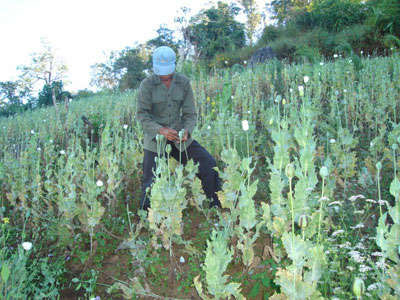A surge in drug trafficking activity around the Shan and Kachin border areas is due to higher populations of displaced people, not poor law enforcement, according to United Nations Office on Drugs and Crime (UNODC) Country Manager Jason Eligh who spoke to Mizzima on Thursday.
 “The number of users has increased [at the Shan-Kachin border] simply because there are more people in the area," says Eligh."If you were to ask health providers and outreach programs in those places they'd say it's more a problem of displacement."
“The number of users has increased [at the Shan-Kachin border] simply because there are more people in the area," says Eligh."If you were to ask health providers and outreach programs in those places they'd say it's more a problem of displacement."
Sources who spoke to the Shan Herald Agency for News (S.H.A.N.) claim that the booming trade is due to law enforcers "turning a blind eye."; however Eligh believes that the problem is more complicated than local corruption.
"It's not really fair to say that," says Eligh, "You can't underestimate how difficult it is for the police to work in an environment of conflict. They can't access the areas they need to, and that makes things incredibly hard."
According to the S.H.A.N. report, local sources believe there has been an increase in crime—particularly theft— in the area. The main drugs being traded by volume include opium, heroin, methamphetamine and ya-ba, which is a mixture of methamphetamine and caffeine; popular in many parts of Southeast Asia.
Shan State is known for being the biggest opium hub in the region, while the synthetic drugs—primarily methamphetamine—are also believed to be manufactured close to the Thai and Chinese borders.
“There's a large amount of manufacturing in Shan, particularly in the north, so availability is naturally high,” says Eligh.
The number of displaced people in the Kachin and Northern Shan areas has reached over 85,000 according to statistics released by the UN Office for the Coordination of Humanitarian Affairs. It is estimated that around 50 percent of these people are in areas beyond government control.
Drug users in the border areas are thought to mainly males between the ages of 13 and 35, primarily those disaffected by the fighting or simply displaced.
The unanimous voices of NGOs working in the area claim that the only solution to the increase in drug trafficking activity is to address the problems of displacement caused by the conflict.
“I think the best approach is containment. It’s nice for politicians to stand up and make promises and pledges, but we can’t afford to speak in absolutes,” says Eligh.
“The big problem is the conflict. There needs to be an end to the conflict before we can even begin to solve these problems."


